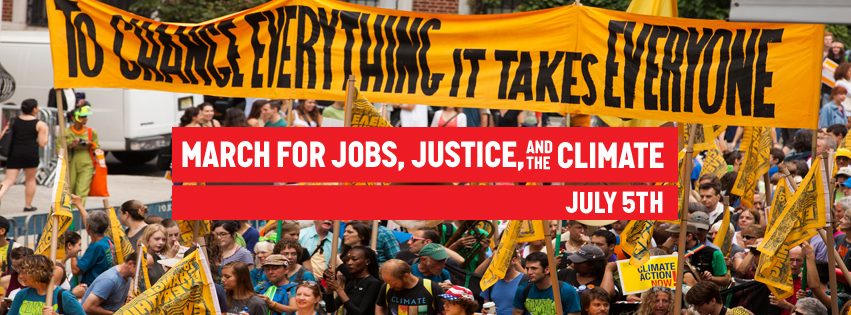Like this article? rabble is reader-supported journalism. Chip in to keep stories like these coming.
Jobs, Justice, Climate is the slogan of what we hope will be a massive march in Toronto on July 5 and Vancouver on July 4. To my knowledge it’s the first action in Canada that has linked jobs with the battle for climate change in a context of social justice. While turtles and teamsters have marched together in the past, it has usually been with a focus on social justice, against corporate globalization and trade deals. This is not only the first time climate change is a focus in a march co-sponsored by the labour movement, it’s the first time that the links are being made to the struggles of Indigenous peoples, immigrants, and people of colour and the first time our cross-sector movement is not just saying what we are against but what we are for. Check out the video promoting the march.
In May I attended a cross-country meeting called by Naomi Klein and Avi Lewis to begin the work of building a broad movement to fight climate change by presenting a new vision where reversing climate change can be done in the context of increasing social justice and good jobs. A movement where Indigenous Peoples, the first defenders of the land, are in the lead. A movement that reaches out to immigrant communities whose countries are already drowning, baking, or collapsing in face of climate catastrophes. A movement where unions realize that climate change is as much a threat to their members as austerity and find ways to link both struggles. A movement where environmental activists understand that it is the peoples of the earth not the corporate overlords who will save the planet.
There were divisions at that meeting and they continue. Unions, for example, support certain pipelines that environmentalists oppose. 350.org, a key organizer of the march wants the bitumen from the Alberta Tar Sands to stay in the ground. The unions don’t agree yet. There remains deep scepticism among Indigenous activists about how solid is the solidarity expressed by settlers. There is concern from activists of colour that support for their issues is only present when their support is needed. There is still the gap of knowledge and sometimes solidarity between Quebec and the rest of Canada. All of these divisions were present in the May meeting and we talked about them.
I pointed out another powerful movement where the differences were just as great. In the anti-Viet Nam War movement some of us supported the victory of the Viet Cong. We used to chant “Ho Ho Ho Chi Minh, the Viet Cong are gonna win;” while others were only in the demonstration because they didn’t want their sons to be drafted. In those days we didn’t have facilitators to help us through negotiating those differences in a positive way. We pretty well hated each other but we marched together because the stakes were high and we contributed to stopping that terrible war. This time the stakes are much higher.
As Naomi argues in her book, This Changes Everything, those of us who have been fighting for social justice all our lives now have an opportunity to create a new vision of a just and caring society. A society where caring for each other, the land and the creatures that share it with us is a powerful transformative idea that can appeal to a majority of people around the world.
Join us on July 5 in Toronto at Queen’s Park at 1 p.m. for the Jobs, Justice, Climate March or you can participate in actions sponsored by 350.org in various cities across the country .



